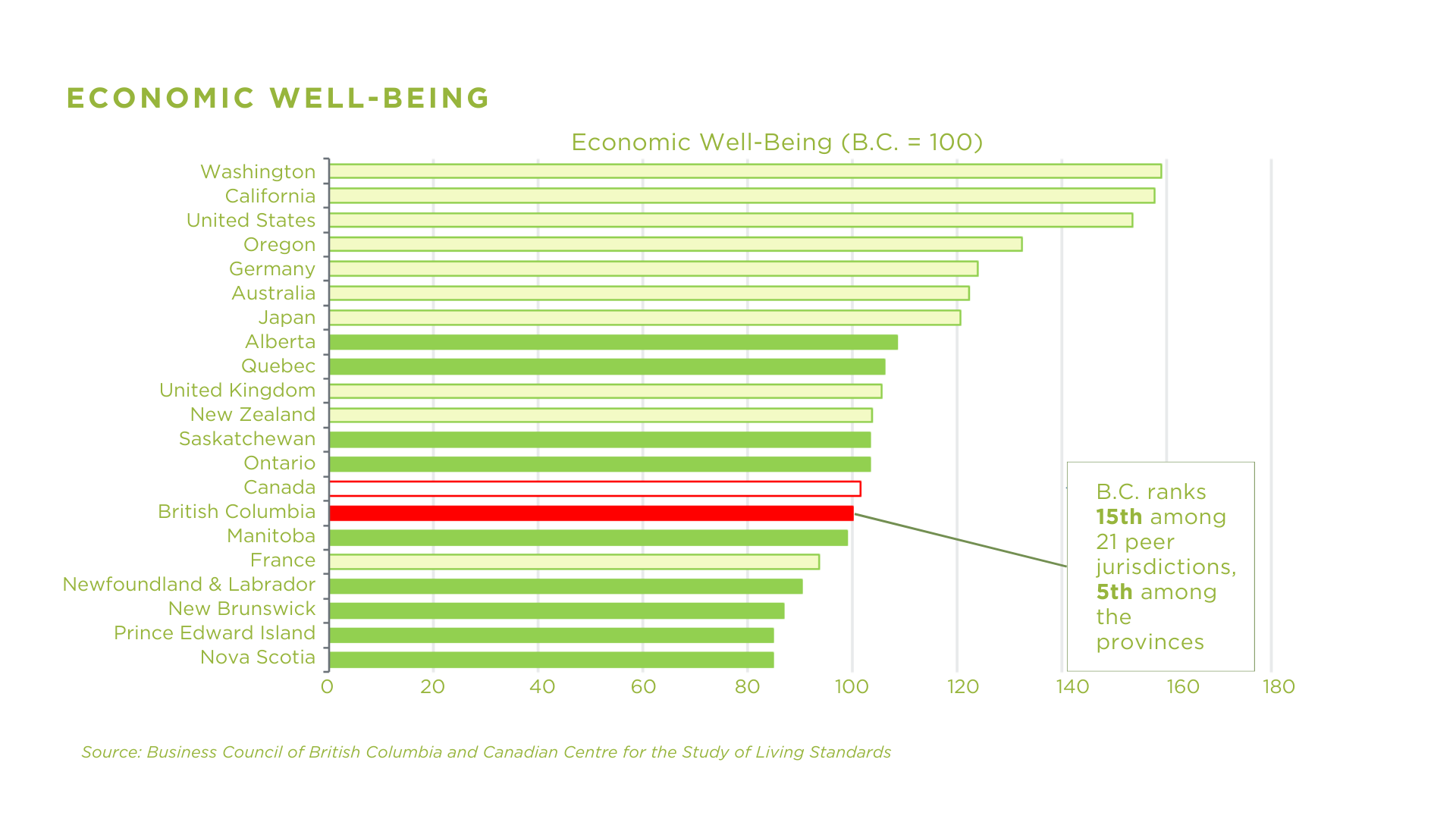B.C. Surviving, Not Thriving Says New Prosperity Benchmarking Report
Media Kit: https://bit.ly/4cblrXJ
According to the 2024 B.C. Prosperity Index, released today by the Business Council of British Columbia (BCBC), B.C. places 11th out of 21 peer jurisdictions for overall prosperity.
The Index, developed with the Centre for the Study of Living Standards (CSLS), compares B.C.’s performance on a range of economic, business, social, and environmental indicators. The province is compared among the ten Canadian provinces, the Pacific U.S. states of California, Oregon, and Washington, and the countries of Australia, Canada, France, Germany, Japan, New Zealand, the United Kingdom, and the United States.
“There’s no medal for 11th place, and for good reason,” says report co-author and BCBC Vice President of Policy, David Williams. “For young families and people aspiring to build a future in this province, prosperity is critical. B.C. has areas of strength, but also areas of weakness it needs to address to ensure we do not lose our best and brightest people to other jurisdictions with better prospects.”
Like other Canadian provinces, B.C. performs well on social and environmental indicators compared to peer international jurisdictions. However, on business and economic well-being indicators, B.C. and most provinces tend to underperform relative to their international peers.
Key Findings:
Overall Ranking
B.C. ranks 11th among 21 advanced national and sub-national economies.
Within Canada, B.C. ranks 3rd among the ten provinces.
Internationally, B.C. places 6th among the eight countries (including Canada) and last when compared to the three Pacific U.S. states.
Business Well-being
B.C. performs average, ranking 11th.
The province scores well in educational attainment (8th highest) and business investment (9th highest).
However, it ranks slightly below average for labour productivity (12th highest) and innovation (13th highest).
Economic Well-Being
Ranking 15th, B.C. underperforms in this category.
While household income (7th highest) receives a relatively good mark, B.C. has room for improvement on economy-wide income (10th highest), unemployment (11th lowest) and housing affordability (least affordable).
Societal Well-Being
B.C. performs above average, ranking 7th.
Strengths include a relatively low poverty rate (4th lowest), good air quality (5th best), and long life expectancy (7th longest).
However, B.C. is a middling performer on greenhouse gas emissions per capita (12th highest) and income inequality (13th lowest).
“B.C. needs to aim higher,” says Williams. “There’s room for improvement in innovation, labour productivity, unemployment, and housing affordability, for example. This is especially true when compared to our international peers, who score significantly higher in such areas.”
According to Williams, this presents both a challenge and an opportunity for B.C. to learn from the successes of other jurisdictions and adopt similar strategies. He emphasizes that B.C. needs to aim higher, focusing on income generation and private sector job growth, especially as several mega capital projects that have been boosting the provincial economy in recent years wind down.
BCBC hopes that today’s report will foster productive conversations within the province and provide an objective basis for benchmarking B.C.’s progress in building prosperity and well-being in the years ahead.









Interviews and additional images are available. Contact media@bcbc.com
CONTACT
Braden McMillan
Director of Communications
Business Council of British Columbia
braden.mcmillan@bcbc.com
About BCBC
Established in 1966, the Business Council of British Columbia is a non-partisan organization dedicated to promoting prosperity for current and future generations.
Comprised of over 200 leading B.C. companies, post-secondary institutions and industry associations, BCBC provides credible information, fosters cross-sectoral relationships and advocates for bold and practical solutions to the policy challenges of our time.



